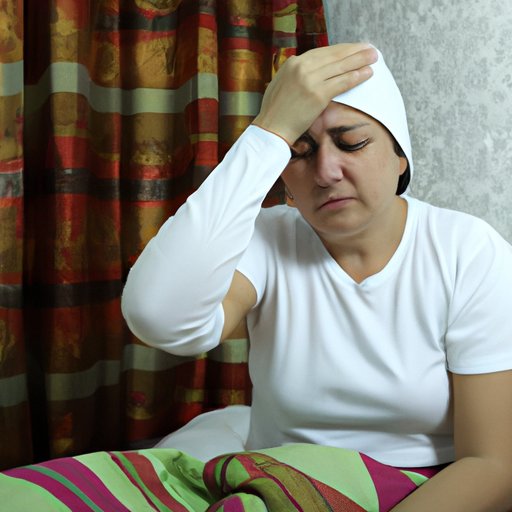
Introduction
Cancer-related fatigue is a common and challenging side effect of cancer treatment that can significantly impact a patient’s quality of life. Fatigue is a pervasive feeling of weariness, lack of energy, and exhaustion that can persist even with rest and sleep. In this article, we explore the connection between cancer and fatigue, understanding the symptoms of cancer-related fatigue, tips for coping with cancer-related fatigue, real-life experiences, mindset, and motivation, and holistic approaches that may help in managing cancer-related fatigue.
Exploring the Connection between Cancer and Fatigue
Cancer-related fatigue is a complex phenomenon that is not yet fully understood. The science behind cancer-related fatigue suggests that cancer and its treatment can cause changes in the body that disrupt normal energy metabolism, leading to fatigue. Different types of cancer treatment can lead to fatigue, including chemotherapy, radiation therapy, surgery, and some medications. Cancer-related fatigue is different from normal tiredness as it persists even after adequate rest, can occur suddenly, and interferes with the ability to perform daily activities.
Understanding the Symptoms of Cancer-related Fatigue
There are different types of fatigue associated with cancer, including physical, emotional, and mental fatigue. Physical fatigue is the most common type of fatigue and refers to the feeling of physical exhaustion and weakness. Emotional fatigue can result from the mental and emotional stress of a cancer diagnosis and treatment. Mental fatigue is characterized by difficulty with concentration, forgetfulness, and an inability to focus. Other factors that may contribute to cancer-related fatigue are anemia, pain, poor nutrition, anxiety, and depression.
Tips for Coping with Cancer-related Fatigue
Managing cancer-related fatigue can be challenging, but there are strategies that can help. During cancer treatment, it is essential to prioritize self-care and establish a routine that provides adequate rest and energy. Exercise routines that include walking, yoga, and stretching can help manage fatigue. Nutritious meals that are high in protein and low in fat and sugar can provide energy. Good sleep hygiene practices, such as avoiding caffeine and creating a relaxing environment, can improve sleep quality. After cancer treatment, it is essential to gradually increase activity levels and plan activities that bring joy and manage stress.
Real-Life Experiences
First-hand accounts of cancer survivors who have experienced fatigue can be helpful in addressing cancer-related fatigue. Many cancer survivors find that fatigue gradually improves over time, and implementing strategies that worked for them played a vital role. Some tips that have worked for others include staying active by participating in physical activities, engaging in hobbies that bring joy, and connecting with others who have shared experiences.
Mindset and Motivation
Mindset and motivation play an essential role in managing cancer-related fatigue. Maintaining a positive outlook can be challenging during cancer treatment, but focusing on small goals and victories can help improve motivation levels. Staying active through physical activities and engaging in hobbies and practices that bring joy can help provide motivation and a sense of purpose. Connecting with others who have shared experiences can be empowering and encouraging.
Holistic Approaches
In addition to conventional treatment approaches, some complementary therapies, such as acupuncture, massage therapy, and mind-body techniques like yoga and meditation, may help in managing cancer-related fatigue. These therapies aim to improve energy levels, reduce stress, and provide a sense of relaxation and well-being. However, it is essential to speak with a healthcare provider before starting any complementary therapies.
Conclusion
Cancer-related fatigue is a common side effect of cancer treatment that can significantly impact a patient’s quality of life. Understanding the connection between cancer and fatigue and the symptoms of cancer-related fatigue is the first step in managing it. There are various strategies, including exercise routines, dietary changes, and sleep hygiene practices, to manage cancer-related fatigue. Real-life experiences, mindset, motivation, and complementary therapies may also help. Managing cancer-related fatigue requires self-care, patience, and persistence, but with the right strategies, patients can find relief and improvement in their quality of life.




